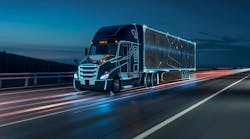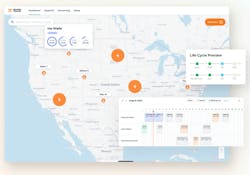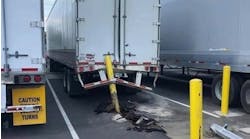“AI is being used in many ways to change how we optimize and manage trucking and logistics companies,” according to Craig Vanderheide, director of product management at Intangles, a predictive analytics company focused on transportation. “It is being used to solve many complex problems that historically have relied on longstanding experience and interpretation of real-world scenarios but are now able to be driven by complex interpretations of real-time data.”
Vanderheide noted that AI can process massive amounts of data in real-time and make intelligent decisions even when faced with new scenarios it has never encountered before. It can learn and adapt over time, improving its performance and efficiency as well as responding to new scenarios. With AI, fleets can foresee trends and likely outcomes.
“AI is just starting to transition into the growth stage of adoption in the trucking and logistics industry,” Vanderheide said. “Today, we see many machine-learning techniques being used to help optimize scheduling, predict costs, conduct predictive maintenance, and observe activities that happen on the road.”
Avoiding biases
BeyondTrucks CEO Hans Galland pointed out that some of the most advanced AI applications include optimization, where computers can evaluate various outcomes of a series of decisions faster, pick the best sequence, incorporate probabilities, and avoid behavioral biases.
“For example, take how a TMS computes driver settlement or invoice charges,” Galland related. “Traditional software needs to write mathematical formulas to calculate driver pay through predetermined rules developed by the TMS software developer.”
“If a new customer has a novel pay scheme, the TMS provider needs to write a piece of new code to accommodate it,” Galland continued. “AI systems, however, promise to either generate the code through natural language understanding—or simply bypass the customized code altogether to calculate the correct math.”
“Applications for optimization with AI exist in load planning as well,” he added. “That’s especially the case where decisions are sequential and subject to human bias because load planners or dispatchers make many critical decisions in the heat of the moment without systematic, quantitative analysis.”
There are numerous areas where AI can potentially transform a modern trucking operation, according to Galland:
- Drivers: safety, monitoring, coaching, and assistance using dashcams and other devices
- Dispatching: load optimization, route optimization, dispatch automation, driver preferences
- Customer service: visibility, ETA estimates, customer communications
- Back office: digitized paperwork using optical character recognition, rate tables, accounting reconciliation, cash-transaction matching
- Management: advanced data analytics for decision-making and visibility
The value these various applications bring is significant, Galland noted. “That can include cost savings, better decisions by augmenting human decision making with algorithms incorporating larger data sets and probabilities and avoiding human biases, reducing risk and improving safety by avoiding errors by flagging risky behaviors, incorrect decisions, or unusual outcomes,” he said.
Addressing intricacies
Artificial decision intelligence, an AI decision-making tool, can make dispatching operations more efficient and help drive profitability, pointed out logistics- and freight-focused Optimal Dynamics in an online post. ADI is particularly applicable in dispatching decisions because of the intricacies of the dispatch manager’s role, which includes managing load assignment decisions, driver schedules, and preferences to maximize profits while working under tight time constraints.
Decision intelligence platforms give dispatchers a critical tool to help them navigate the daily complexities of their jobs, the company related. These platforms factor in numerous dynamic variables, handle thousands of calculations, and assess hundreds of possible simulated outcomes. If dispatchers dealt with all of this independently, not only would a single driver/load pairing iteration take up valuable time, but it would also need to be repeated until there were sufficient network scenarios to compare and consider.
Since each load assignment decision impacts the next, the company explained, this quickly becomes too complex for even the most experienced dispatchers to realistically handle. Dispatchers must also adapt to real-time changes. They may have known the optimal decision initially, but it may differ if a load is canceled. If this is the case, the problem must be reworked with the latest information.
Core value
At its core, Mike Hamill, SVP of strategy for Trimble Transportation, pointed out that AI is poised to have a profound impact on trucking operations by breaking down data silos. “Fleet data can come from many systems and devices," he said. “Integrating that data into a platform where managers have a holistic view of operations is complex.”
“AI-driven transportation technology can create efficiency and productivity with solutions that can give clear guidance on everything from complex route optimization to pricing and bidding to driver performance,” Hamill said.
The winners in AI, Hamill added, will take over a portion of the relationship management and mundane, repetitive tasks so individuals can be more productive, build deeper working relationships, and add more value while meeting their company’s operational goals.





